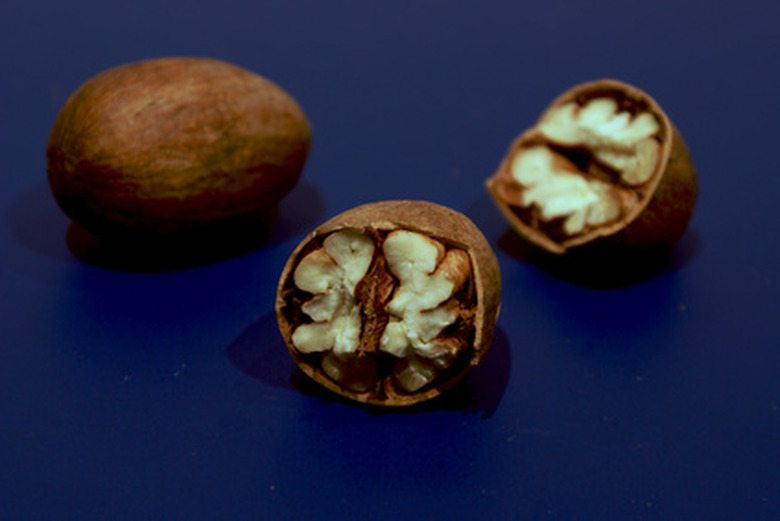Types Of Zinc To Put On Pecan Trees
Zinc is essential to the development of pecan trees. When deficient, young leaves may curl and develop a rosette pattern. Narrow leaves and terminal die-back are also signs of a zinc deficiency. This problem can be corrected by applying zinc either as a ground application or a foliar spray. According to University of Arkansas, your soil's pH level will help determine which is used. Alkaline soils have carbohydrates that make the zinc inaccessible to the tree, which means it must be applied to the leaves. Acidic soils do not have this problem.
- Zinc is essential to the development of pecan trees.
- Alkaline soils have carbohydrates that make the zinc inaccessible to the tree, which means it must be applied to the leaves.
Zinc Sulfate
Zinc sulfate may be applied as either a soil treatment or a foliar spray. According to New Mexico State University, zinc sulfate tends to get tied up in the soil and will be absorbed better if applied as a foliar spray. It is often applied as a late dormant spray. Apply between 0.5 to 1.0 lbs. of zinc sulfate per acre if each acre receives 20 gallons of solution. When applied to the soil, a few ounces of zinc sulfate is sufficient for small trees, while larger trees may require several pounds. Zinc sulfate is highly corrosive. Make sure to rinse spray tanks, pumps and anything else that comes in contact with zinc sulfate.
- Zinc sulfate may be applied as either a soil treatment or a foliar spray.
- When applied to the soil, a few ounces of zinc sulfate is sufficient for small trees, while larger trees may require several pounds.
Zinc Chelate
Zinc chelate release zinc more slowly than zinc sulfate, which makes it more available to the trees' roots since it is less likely to get fixated in the soil. Unfortunately, it is also more expensive. It is often used as a summer application. When mixing zinc chelate in water, make sure the solution supplies 0.15 lbs. of zinc per acre if each acre receives 20 gallons of solution.
Zinc Oxide
Zinc oxide is slowly soluble and not effective in its granular form. According to the University of Minnesota, in order to be used, it must be finely ground. Unfortunately, it then becomes problematic to spread since it is easily blown away. Therefore, it is best to limit its use to when also using suspension formulas.
- Zinc chelate release zinc more slowly than zinc sulfate, which makes it more available to the trees' roots since it is less likely to get fixated in the soil.
- Therefore, it is best to limit its use to when also using suspension formulas.
